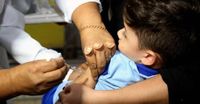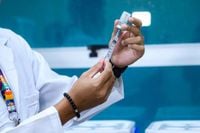On Saturday, May 10, 2025, Brazil is gearing up for the 'Dia D' vaccination campaign against influenza, a crucial initiative aimed at safeguarding the health of millions before the winter months, when respiratory illnesses typically surge. This nationwide effort, excluding the North region, is expected to vaccinate over 81.6 million people, representing 90% of the target population, which includes vulnerable groups such as children, the elderly, and pregnant women.
The campaign officially kicked off on April 7, 2025, and aims to reach significant vaccination goals: over 32 million elderly individuals, 15 million children, and 1.6 million pregnant women are among those prioritized for immunization. The Ministry of Health has distributed more than 51.3 million doses of the vaccine to states and municipalities, ensuring that health facilities are well-equipped for this critical mobilization.
In Florianópolis, for instance, more than 30 vaccination points will operate from 8 AM to 5 PM on the day of the event. Health Secretary Almir Gentil emphasized the importance of this initiative, stating, "Our vaccination goal is currently well below expectations, and immunization is the best form of prevention, especially for the most susceptible groups."
The flu vaccine being administered is a trivalent formulation, designed to protect against three strains of the virus: Influenza A (H1N1), subtype A (H3N2), and Influenza B. This vaccine typically takes about 15 days to become effective, providing significant protection against severe cases and fatalities. According to the Ministry of Health, the vaccine can reduce severe cases and deaths from the disease by up to 60%.
In light of rising cases of respiratory illnesses, the campaign is particularly timely. The latest Infogripe bulletin from the Oswaldo Cruz Foundation (Fiocruz) reported over 45,000 cases of severe acute respiratory syndrome (SRAS) this year, with a notable percentage attributed to the respiratory syncytial virus (RSV). The increase in cases has been especially pronounced among children under two years old, while adults and the elderly are also facing rising hospitalizations due to influenza A.
As part of the 'Dia D' initiative, citizens are encouraged to not only receive their flu shots but also to update their routine vaccinations. Various vaccines will be available, including those for pneumococcus, DTPA (triple bacterial), pentavalent, meningococcal ACWY, rotavirus, BCG, HPV, hepatitis A and B, yellow fever, and the triple viral vaccine (measles, mumps, and rubella). However, the Covid-19 vaccine will only be available for children under 5 years, pregnant women, the elderly, and other priority groups.
In São Paulo, the campaign will unfold across all 645 municipalities, targeting 19.3 million individuals in priority groups. Despite the current coverage rate of only 16.1% among these groups, the state aims to achieve a 90% vaccination rate. Tatiana Lang, director of the Epidemiological Surveillance Center, stressed that the flu vaccine is the most effective means of protection against the virus, noting that it is updated annually to respond to the virus's frequent mutations.
The health ministry has implemented this national mobilization as a response to the alarming rise in respiratory illnesses. Fiocruz's data indicate that 42.9% of reported cases of severe acute respiratory syndrome this year tested positive for some respiratory virus, with RSV being the most common. The ministry has urged eligible groups who have not yet been vaccinated to do so as soon as possible to mitigate the spread of influenza.
As the country braces for the upcoming winter season, the 'Dia D' vaccination campaign stands as a vital public health initiative. The collaborative effort between federal, state, and municipal governments aims to bolster immunization rates and protect the most vulnerable populations from the potentially severe impacts of influenza and other respiratory diseases.
In summary, the 'Dia D' campaign represents a concerted effort to mobilize the Brazilian population in the fight against influenza, ensuring that millions have access to life-saving vaccines. With the rise in respiratory illnesses, the importance of vaccination cannot be overstated, and public health officials are hopeful that this initiative will lead to a significant reduction in cases and hospitalizations.






